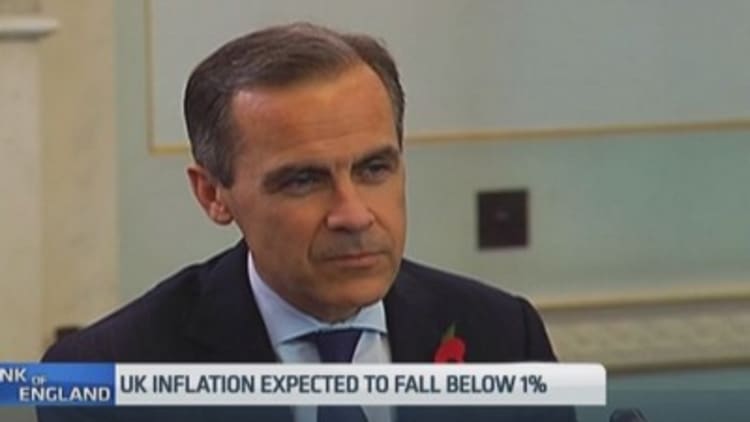
The rate of inflation in the U.K. fell to 0.5 percent in December year-on-year, according to the Office of National Statistics (ONS) -- its lowest level in 14 years.
Growth in U.K. consumer prices halved from November's 12-year low of 1 percent, and came in below forecasts of 0.7 percent.
The fall below 1 percent means the Bank of England (BoE) Governor Mark Carney will now have to write an open letter to the U.K.'s Chancellor George Osborne explaining why prices have declined below this level.
The central bank's brief is to use monetary policy to keep the inflation rate - measured by the consumer prices index (CPI) - within a percentage point of the bank's target of 2 percent.
Carney will have to tell Osborne when the BoE expects inflation to return to within target, and what action the bank's Monetary Policy Committee intends to take to achieve this.
The last open letter was penned by former BoE Governor Mervyn King back in January 2012 when the inflation rate hit 3.6 percent - well above the 2-percent target. It marked the last in a spate of open letters from King to Osborne.
Chris Williamson, chief economist at Markit, said that Carney's letter "will no doubt also indicate that inflation could fall further in coming months as lower oil prices continue to feed through to the consumer alongside intense competition among supermarkets."
The CPI tracks the prices of a typical "shopping basket" of everyday goods in an effort to represent consumer spending patterns.
The decline in global oil prices -- which have fallen more than 60 percent since June 2014 -- and a price war between U.K. supermarkets have contributed to the decline in prices.
With no sign that oil has hit a bottom -- the price of benchmark Brent crude is hovering around $46 -- next month's inflation data could be even worse, one analyst warned.
"This is the number for the month of December when oil was not at a level where we are today. So, for the next month it could be even worse," Naeem Aslam, chief market analyst at Ava Trade, said in a note Tuesday.
However, Aslam and other analysts noted that, from a consumer perspective, the inflation data was good news, as the average shopper's purchasing power will increase.
"Conventional wisdom is that deflation is a bad thing which leads to a negative economic spiral as households stop making purchases in anticipation of future price falls," Scott Corfe, head of U.K. Macroeconomics at the Centre for Economics and business Research (Cebr), said in a note Tuesday.
"But this hardly applies when the main driver of deflation, as would be the case in the U.K., is falling essentials prices; households won't stop purchasing food because prices might be lower in a month's time."
He added that, as such, "good deflation" frees up household spending power and boosts demand for discretionary goods and services.
The data has added to speculation that the BoE will hold off raising interest rates into the latter half of 2015 at the earliest.
Howard Archer, chief U.K. and European economist at IHS Global Insight, said "there is clearly a very real possibility that the Bank of England will delay acting until early 2016."
- By CNBC's Holly Ellyatt, follow her on Twitter @HollyEllyatt


